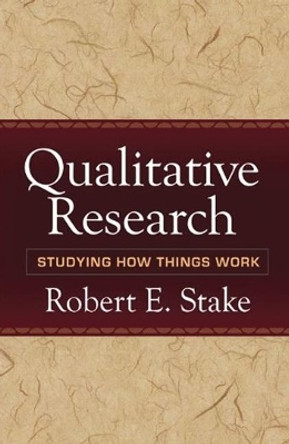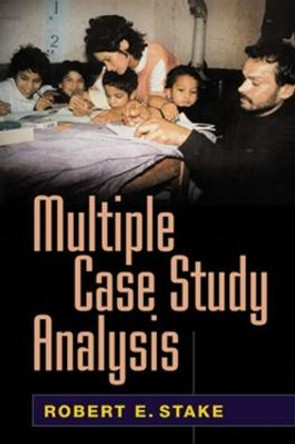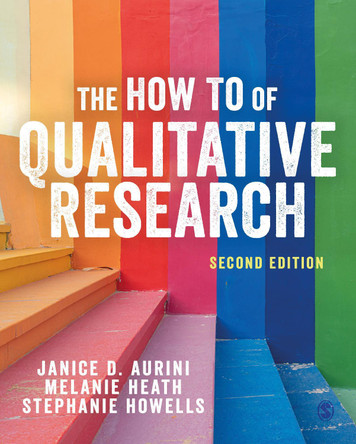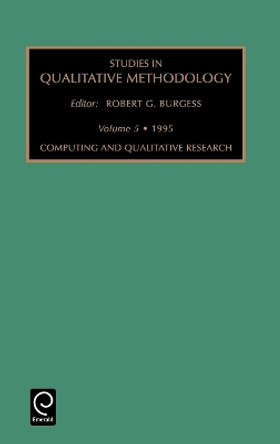Description
This book provides invaluable guidance for thinking through and planning a qualitative study. Rather than offering recipes for specific techniques, master storyteller Robert Stake stimulates readers to discover how things work in organizations, programs, communities, and other systems. Topics range from identifying a research question to selecting methods, gathering data, interpreting and analyzing the results, and producing a well-thought-through written report. In-depth examples from actual studies emphasize the role of the researcher as instrument and interpreter, while boxed vignettes and learning projects encourage self-reflection and critical thinking. Other useful pedagogical features include quick-reference tables and charts, sample project management forms, and an end-of-book glossary. After reading this book, doctoral students and novice qualitative researchers will be able to plan a study from beginning to end.
About the Author
Robert E. Stake is Director of the Center for Instructional Research and Curriculum Evaluation at the University of Illinois at Urbana-Champaign. He is one of several educational researchers who created theory and practice for educational program evaluation in the 1960s. His responsive evaluation approach emphasizes the study of classroom experience, personal interaction, and institutional processes and contexts, often in the form of case studies. Among the evaluative studies he has directed are studies in science and arts education; model programs; and conventional teaching, including higher education, special education and, with Bernadine Evans Stake, gender equity. He is a recipient of the Special Career Award in Qualitative Inquiry from the International Congress for Qualitative Inquiry, the Lazarsfeld Award from the American Evaluation Association, and the Presidential Citation from the American Educational Research Association, and holds honorary doctorates from the University of Uppsala, Sweden, and the University of Valladolid, Spain. For many years, Dr. Stake has been a prominent voice in a transatlantic invisible college of like-minded evaluators questioning contexts and conventions for educational evaluation and infusing evaluation with fairness and a valuing of experience.
Reviews
"Stake invites readers in, sits down with us, and shares what he has learned about qualitative research from years of first-hand experience. His discussion, supported with helpful examples, cases, and concept maps, is theoretically grounded but at the same time user friendly. Taking readers on a masterful and engaging journey from understanding what qualitative research is all about, to designing a study, to writing the final report, this book has something for both new and experienced qualitative researchers and practitioners across the social sciences."--Sharan B. Merriam, EdD, Department of Lifelong Education, Administration and Policy (Emeritus), University of Georgia "For those who have never had the privilege of taking a class with Stake, this book is the next best thing. It is truly written in his voice, with his timing, pacing, clarity, directness, and humor. Each chapter is a small adventure, shaped by decades of practice, filled with authentic examples, and replete with fertile resources from a lifetime of reading that has never been limited to program evaluation or pure scholarly work. Rather, Stake's examples tie in the history of science, philosophy, great literature, and other markers of renaissance men and women everywhere. This is his best, most fascinating and engaging work thus far."--Yvonna Lincoln, PhD, Distinguished Professor and Ruth Harrington Endowed Chair of Educational Leadership, Texas A&M University "This remarkable book tells us clearly how qualitative research works. It distills the author's lifetime of experience in qualitative inquiry, addressing the aims and conduct of such research in ways that are cogent and wise. Expert and novice researchers alike will find much to learn here. The author's direct, modest voice almost belies the sophistication of his discussion of key issues of theory and method in qualitative inquiry. A special feature is the inclusion of lengthy examples from actual studies, which show fundamental processes of decision in the collection, analysis, reporting, and interpreting of evidence."--Frederick Erickson, PhD, George F. Kneller Professor of Anthropology of Education, University of California, Los Angeles "This is a very readable book. Stake doesn't tell students what to do, but helps them think about their work in ways that will improve their research questions, data collection, and analysis. The emphasis on thinking about research is missing from many qualitative textbooks, and is the reason why this one will be mandatory reading for my advisees who plan to use qualitative methods in their dissertations. An important contribution."--Janet Usinger, PhD, Department of Educational Leadership, University of Nevada, Reno
"Using as few words as possible, the author has communicated the complex nuances of qualitative research: its assumptions, purposes, and methods. From the identification of the research topic and generation of research questions to the gathering and analysis of the varieties of qualitative data, Stake guides the reader through the process of conducting and interpreting research and writing a report. This book will become a handbook for novices as well as veterans who pursue qualitative research. I used it extensively giving Fulbright lectures in Mexico."--Robert Louisell, EdD, Professor Emeritus, St. Cloud State University, Minnesota - A strength of Stake's writing is that he uses examples from a range of topics, projects, and people to describe the points he discusses. He uses examples from graduate students who have been successful, from colleagues he has worked with, and from his own research. This breadth of examples gives the reader multiple perspectives of how qualitative practices can be used and are applicable to all types of projects, formal or informal, large or small, individual or collaborative. Throughout his book, Stake (2010) makes the effort to engage the reader by using a conversational tone and a style that makes the content clear and concise, without sounding overly simplistic....In addition, the effort by Stake early in the book to introduce himself to the reader gives a sense of personalization and collegiality....Provides the reader with various 'tasks' and critical thinking 'assignments' that one can use as practice, to reiterate many of the ideas conveyed in this book....Stake makes it clear to the reader that both qualitative and quantitative aspects exist in any study, and that the lines between the two are not always as clear as they may seem, overlapping and complementing each other in both obvious and subtle ways....A range of scholars and academics would find this book very useful....Beginning graduate students, whether on their own or with a class, would be wise to use this book as a starting point in thinking about the basics of qualitative research, as well as some of the complexities that come with it. This is also a book they may want to keep around, for future reference, once they have a solid grasp of those basics. More advanced students and researchers would benefit from Stake's clear descriptions of some of the finer nuances of qualitative research and inquiry, as well as his focus on duality....I anticipate this being a book I can use again and again, each time gaining a clearer understanding of the complex process of studying how things work. Overall, the way in which Stake's book 'works' is through his ability to be fully invested in the reader using only paper and ink; to use clear, concise description, coupled with the challenge to think about issues deeply and complexly, to support readers as well as challenge them; to make strategies adaptable to small or large studies; to give an overview of the concepts, assumptions, processes and procedures of qualitative design and encourage readers to struggle with the intricacies and specificities of their own research. Stake encourages readers to take on an active role in the study of qualitative research, consider its relationships and uses, and question what will work in their own inquiry. --Qualitative Report, 3/5/2010ff The book is written with great clarity and offers important ideas and smart suggestions to the reader....The book begins by outlining 18 practical projects that could be accomplished as part of a qualitative research course....These projects are sensible and provide students with opportunities to gain needed skills. The book is also written at multiple levels of sophistication, so that an experienced researcher will find much useful discussion of purposes and meaning of qualitative research, while the less experienced graduate students preparing dissertation research will find useful strategies and rules-of-thumb. For someone-like me-planning to teach a course on qualitative research methods, Stake provides a good balance of qualitative research strategies with practical illustrations of methods and a deeper discussion of the place of qualitative work in the research community and in the world....Every chapter in Robert Stake's Qualitative Research is thoughtful, and presents a richly textured understanding of what qualitative research tries to accomplish and how it furthers our understanding of human experience. The combination of clear writing, practical guidelines, and illustrative examples, makes for a great book. I have ordered the book for a doctoral level course on qualitative research methods that I will be teaching next semester. I would adopt the book as a required text in qualitative inquiry and qualitative methods courses aimed at graduate students in education and other professional disciplines such as public policy or public affairs. Qualitative Research is also a great read for anyone interested in understanding how the world works. --Education Review, 3/5/2010ffA rich and thoughtful text....Perhaps the principal virtue of Stake's book is arguably its practicality. Large parts of Stake's book read as a kind of manual for qualitative researchers....Graduate students faced with the subtleties of writing up qualitative researchand there are many such subtletieswould be well advised to consult it....Stake goes a long way toward showing how qualitative research works....And he does so with a careful measure of practical wisdom....Stake has done a splendid job introducing both beginning and more experienced readers to the field of qualitative research, and he has done this in such a way as to convey a clear, practical sense of how good qualitative research should be done. The book should be read by students, teachers, practitioners, and anyone else who seeks to understand the human enterprise in a methodical and disciplined way.--Canadian Journal of Program Evaluation, 5/28/2013
Book Information
ISBN 9781606235454
Author Robert E. Stake
Format Paperback
Page Count 244
Imprint Guilford Publications
Publisher Guilford Publications
Weight(grams) 358g









